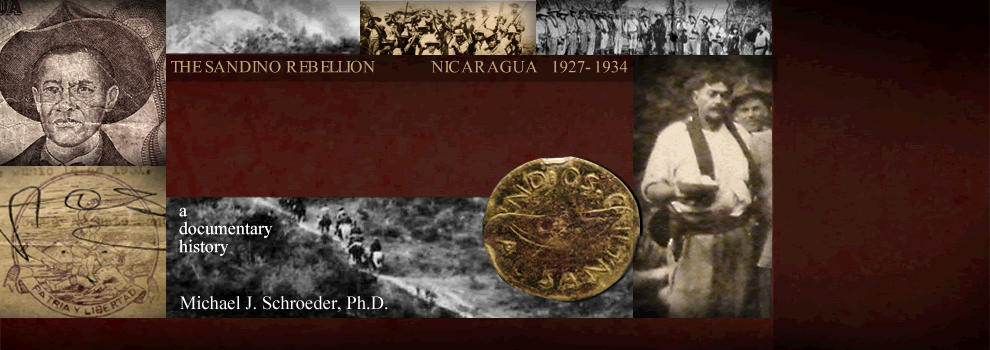|
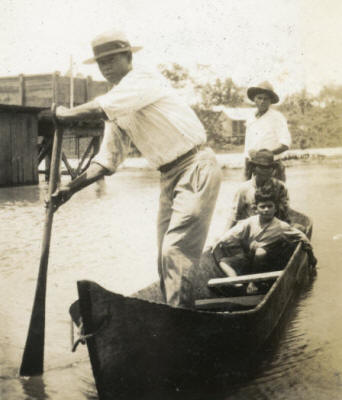 THIS IS THE SECOND PAGE OF
DOCUMENTS FOR THE SECOND HALF OF 1929
on Nicaragua's Caribbean Coast region, housing
materials dated during October, November & December.
THIS IS THE SECOND PAGE OF
DOCUMENTS FOR THE SECOND HALF OF 1929
on Nicaragua's Caribbean Coast region, housing
materials dated during October, November & December.
"So that we poor Indians may receive
our rights," reads the
petition from the Miskitu of
Bluefields to the President of the
United States (Oct. 9), one of
several documents on this page that
illuminate aspects of the struggles
of Costeños for their rights of
citizenship. Thanking the USA
for sending in the Marines during
the recent revolution and soliciting
US help in reversing the 1894
Reincorporation treaty that made
“the Mosquito Coast” part of Western
Nicaragua, the petition offers a
fascinating historical narrative
that condemns the Nicaraguan
Government & emphasizes Miskitu
autonomy & independence as its
primary political aim. Another
exceptionally revealing document, a
circular in English & Spanish
produced & distributed by union
organizers in Puerto Cabezas and
Bilwi on Sunday, October 20,
denounces the Bragmans Bluff Lumber
Company and other large export firms
as tyrannical and announces a strike
by Miskitu Indians “to break the
chains of slavery with which that
company holds them, paying miserable
salaries” (25 Oct). The
discourse of citizens’ inalienable
rights before the state and foreign
capital is striking here, especially
since the circular makes no mention
of Sandino, and concludes with a
“viva!” for Sandino’s arch-enemy
President Moncada.
Just
as remarkable, the next day
(Monday, October 21), US military
intelligence catches wind of Sandino
handbills in Bluefields & Puerto
Cabezas, likely circulating for some
days now (11 Nov). Sandino's
appeal thus has no evident effect on
the discourse or practices of
Bragmans Bluff union organizers.
A week later (29 Oct), US Consul S.
J. Fletcher reports that Sandino
sent two packages of “revolutionary
propaganda” to Dr. Onofre Sandoval
and the Comandante de La Cruz on the
Río Grande and both were turned in
to the authorities. Sandino is
trying to propagandize the
Coast, and is reasonable to suppose
that some Sandino propaganda made it
through the counterinsurgency net.
If so, its message shows no evidence
of resonating among Consteños.
Also noteworthy are the 5-page
“Estimate of the Situation in the
Eastern Area” by Area Commander
Major C. H. Metcalf (21 Nov); the
relevant pages of The Bluefields
Weekly; and the year-end report
by J. A. Fisher of the Moravian
Church.
|
|
PERIOD MAPS
|
|
1894 mosquito
shore

27 MB,
library of congress
|
1920s
Standard Fruit

6.5 mb,
US National archives
|
1928 Rio wanks
Patrol

3 mb, us
national archives
|
1931 Moravian

2.4 mb,
comenius press
|
|
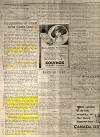
|
5 October
1929.
The
Bluefields Weekly.
"The possibilities of a boom on
the Atlantic Coast. By R. M.
Hooker. ¶ The Atlantic Coast of
Nicaragua is well favored to enjoy a
period of prosperity that will bring
about its modernization and give its
hard working, honest people their just
rewards for which they have looked
forward with long expectation. We say
that this section will enjoy a great
financial boom because we know that we
possess the best agricultural lands that
can be found in Central America. We also
have plenty of gold yet to be mined,
rubber resources to be tapped, timber to
be hewn down and made into lumber, and
besides, we expect to have what will
make us the most coveted nation on the
face of the globe. We refer to the
Nicaraguan canal. With these important
factors in view there is no need for
Nicaragua to become pessimistic over
present conditions. ¶ Natives who own
lands in various sections of Nicaragua
should by all means begin to search in
their trunks for their titles, and see
that they are in first class legal
condition so that when any difficulties
arise they will be in no danger of
losing their property. Our people must
begin to plant and to endeavour to
become a small class of independent
farmers. To do this will enhance their
position in the eyes of the capitalists
who will be coming out to spend their
money in our country. ¶ It has always
been asked how we can do anything to
bring capital to Nicaragua. Well, how
about advertising Nicaragua to the world
and letting European and American
businessmen know what kind of a country
we have from the standpoint of climate
and natural resources. Some of the best
lands for the building of towns and
cities are left untouched and people
inhabit the sickly coastlands that are
hot instead of the cooler lands of the
rivers and mountains. ¶ Another very
essential factor in the understanding
and the creation of the new social and
economic order in our country is some
adequate legislation under which the
capitalist and the laborer meet on an
equal footing. There is no reason in the
world why Americans and Europeans should
come in here and make fortunes and the
sons of the soil suffer as we have done
in the years that are gone. We demand a
new social order, higher wages and the
employment of Nicaraguans first and then
foreigners. We have always been proud
that we possess the most democratic
little country in the world and we want
to keep it that way. The laws of
Nicaragua in this respect should be more
flexible and foreign capitalists should
be made to understand that there are
certain rules that must be complied with
before they are allowed to treat our
people as they feel. This has led to
more ill feeling and has hampered
production and business in our country
more than anything. Employers must
organize and laborers must do the same
so that when the time for the boom
arrives we will be ready to meet it. ¶
Latin Americans are today afraid of
capitalists because of mistreatment. In
all our dealing with them we have been
the losers. We realize that the time has
arrived for us to speak our mind on this
question. We mean from now on to
organize our people and to demand our
rights and to lay the facts before our
government in such a manner that
something must be done. Nicaraguans want
money but we do not intend to sell our
birthright to get wealth. We want the
capitalists to be frank with us. We have
the natural resources that they want.
They have the money. We must strike a
bargain that will benefit us both. Now
what we want is the same fair treatment
that the American laborers get in the
United States. No capitalist can dare
tread on his rights and we in Nicaragua
are working for those conditions.
Spaniards, Creoles and Indians must
begin to realise that this is a new day
and that all people and races must help
themselves and must organize in the
defence of what belongs to us. At the
same time we must always be tolerant and
broad-minded to the capitalist, always
remaining firm and steadfast in our
conclusions. In the meantime let us look
over our property and be ready for the
rush."
|
|
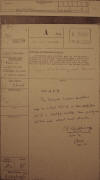
|
1.
9 October 1929.
Petition from the
Miskitu Indians of Bluefields to
the President of the United States, p.
1. Submitted to British Consul Owen
Rees, to be forwarded to the United
States Government; last page missing.
"Transmits
copy petition sent by the Mosquito
Indians to the United States President,
giving the history of their race,
calling attention to their present day
position and expressing the hope that
they may fall under the protection of
the United States."
|
|
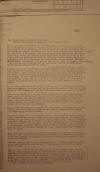
|
2.
9 October 1929.
Petition from the
Miskitu Indians of Bluefields to
the President of the United States, p.
2.
" . . . His
Excellency H. C. Hoover, President, and
the Honorable Government of the United
States ¶ May it please your Excellency
and most esteemed and Hon. Government.
We the Mosquito Indians of the territory
known as the Mosquito Coast – extending
from the Wanks River to Greytown – a
distance of about two [hundred] and
fifty miles – but which has been
incorporated since 1894 in the republic
of Nicaragua – beg to approach your
Excellency and Government on a matter of
extreme vital importance which concerns
us as a people and our beloved country,
the Mosquito Coast, praying that your
Excellency and Hon. Government will
intervene on our behalf, and adjust this
affair for us, so that we may enjoy the
rights, privileges and advancements as
are being enjoyed by modernized counties
and peoples of the world. ¶ We are
convinced and are quite as linguine that
your Government, the most powerful in
the world, and one that stands for
justice, equity, love, liberty, and
advancement, educationally,
commercially, and industrially, will
give our grievances as set forth, your
most earnest and diplomatic
consideration, and set accordingly on
our behalf, so that we receive those
things which by international laws, are
our rights and privileges. In
consequence thereof we respectfully beg
to make the following authentic
statements:- ¶ 1 ¶ Be it known that we
the Mosquito Indians were a Free and
independent race from before the arrival
of Christopher Columbus to the western
world in 1492 having our own form of
government and ruled by our kings. ¶ 2 ¶
That in the early part of the 17th
century one of our kings, Jeremy by
name, went to Jamaica B.W.I. to the Duke
of Albemarle, the governor of the
Island, and prayed that his country, the
Mosquito Coast be taken under the
protection of the English Government as
he, the King Jeremy, feared the
Spaniards who were then swarming to the
western world, which request was
granted. ¶ 3 ¶ That it was the Mosquito
Indians who befriended the great
discoverer and helped him in his sad
predicament when he landed at the place,
now named Cape Gracias a’Dios. ¶ 4 ¶
That we Indians and our beloved country
the Mosquito coast remained under
England’s protection until the year
1860; when on the 20th of January of the
same year (1860) a treaty called the
Treaty of Managua was made between the
British Government and Republic of
Nicaragua, by which our country the
Mosquito Coast was placed under the
protection of Nicaragua – we will having
reserved to us our rights and privileges
of self government - having our ruler
whose title was reduced that that of
chief. ¶ 5 ¶ That these above mentioned
conditions continued until on the 13th
of February 1894 – when the Nicaraguan
Government overthrew the Mosquito
Government, seized our country by force
of arms, thus violating the Treaty of
Managua. ¶ 6 ¶ That our chief Robert
Henry Clarence was by existing
conditions forced to seek refuge in the
Island of Jamaica, B.W.I. – where he
remained until he died. ¶ 7 ¶ That to
make sure of having our beloved country
here fixed in its deadly grasp, and
probably to vindicate and establish its
rights of ownership, the Nicaraguan
government called delegates of Indians
from various villages to Bluefields and
by sweet words and glorious promises,
together with a free distribution of
intoxicating liquors, drew a document
called the Mosquito Convention, to which
this Nicaraguan Government caused the
Indians to affix their names. (Copy of
Mosquito Convention enclosed) . . . "
|
|
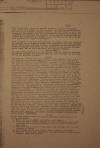
|
3.
9 October 1929.
Petition from the
Miskitu Indians of Bluefields to
the President of the United States, p.
3. Submitted to British Consul Owen
Rees, to be forwarded to the United
States Government; last page missing.
" . . . 8 ¶ That
thirty-four years have passed since the
signing and putting into effect this
solemn law and convent – the Mosquito
Convention – yet not one of the decrees
contained therein has been lived up to
by the Nicaraguan Government. That the
Nicaraguan Government has totally
disregarded the Decrees of the Mosquito
Convention, and therefore has forfeited
all rights and privileges to our
country, as set forth in the said
document – the Mosquito Convention. ¶ 9
¶ That in spite of the fact that
millions of dollars have been collected
as revenues in the Mosquito Coast – the
customs alone aggregating about
thirty-three million dollars –
absolutely nothing has been done by the
Nicaraguan Government for the benefit of
our country – the Mosquito Coast, and we
the inhabitants the Mosquito Indians. ¶
Art, 2, says:- ¶ All the revenues
produced in the Mosquito Litoral, shall
be inverted in its own benefit. The
revenues have not been inverted for the
benefit of the Mosquito Litoral. ¶ Art,
3, ¶ The mosquito Indians have been
forced to bear arms and fight and to do
other military services. (Art, 4,) That
taxes have been imposed on the Mosquito
Indians which they were compelled to
pay. (Art, 5,) That the post of
Inspector has not been held by any
Mosquito Indian except one, and that
very recently. That the post of
Inspector has always been, in every
place, held by a Nicaraguan Spaniard
styled the ‘Commandante’, whose only
desire was and is to inflict heavy fines
for the most trivial offenses, most of
which (fines) went into his own coffers.
(Art, 10,) That in consequence of the
non-fulfillment of the decrees of the
solemn law and convent – the Mosquito
Convention, by the Nicaraguan
Government, we the Mosquito Indians
declare this document the Mosquito
Convention becomes null and void and the
act of incorporation annulled. (Art,
11,) That we Indians, being unable to
fight for our rights and could never
think of raising up in arms against the
Nicaraguan Government, being extremely
powerless to do so. (Art, 12,) And
realizing that our beloved country and
ourselves are practically going to ruin,
and desiring for ourselves and children
and the generations to come the
blessings and privileges now enjoyed by
modern civilized counties. (Art, 13,)
And that our heartfelt desire is to be
released from the yoke of the Nicaraguan
Government – who has deliberately and
openly, before the world, disregarded
and discountenanced the solemn law and
covenant – the Mosquito Convention,
which they drew up and signed. ¶ (Art,
14,) Therefore we humbly pray that your
most esteemed and Honorable Government
will intervente on our poor Indians'
behalf and take up the matter with the
Nicaraguan Gov't and adjust same so that
we poor Indians may receive our rights,
as are put forth in our despatch to the
Nicaraguan Government. ¶ (Art, 15,) We the
Mosquito Indians - hereby too, beg
respectfully to express our sincere
thanks and heartfelt gratitude to your
Excellency and Government for the timely
and kind protection offered to us during
the recent revolution in this country --
for had the United States Marines, not
been seen here many, yea; many of us
poor Indians would not be alive to-day.
¶ Art, 16, We may here mention that
ourcountry has waste resources, but
require development. ¶ A. There is very
much gold, silver and copper. ¶ B. There
are waste tracts suitable to rice
cultivation, from which thousands and
thousands of bushels of rice could be
harvested each year. ¶ C. There are
waste tracts of savannahs very suitable
for the cultivation of cotton. ¶ D. Our
forests abound with rubber, pine,
mahogany and cedar. ¶ E. That our soil
is well adapted to the cultivation of
pine-apples, bananas, and citrus fruits.
..." [NOTE:
The final page of this petition is
unfortunately missing.]
|
|
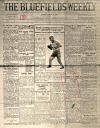
|
12 October
1929.
The
Bluefields Weekly.
"Captain R. D.
Leach to be tried by Court Martial next
week. ¶ Capt. R. D. Leach arrived by
airplane from Puerto Cabezas yesterday.
Next week Tuesday or Wednesday he will
be tried by Court Martial on a charge in
connection with the recent wounding of
Daniel Sierra. ¶ The Court will be
comprised of the following Officers:-
Major Metcalf, Major Linscott, Capt.
Regan, Captain Simms of the National
Guard, Dr. Baker, and Lieut. Hassen
Miller. ¶ The trial will take place at
the Tropical Club. Whether or not the
proceedings will be open to the public
will be decided by the president of the
court."
|
|
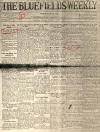
|
19 October
1929.
The
Bluefields Weekly,
p. 1.
"Trial of
Captain Ralph D. Leach by Court Martial.
¶ On Thursday morning the trial of
Captain Ralph D. Leach, who was until
recently attached to the National Guard
in this area, on charges connected with
the wounding of Daniel Sierra on the
night of the 30th of August last was
commenced. ¶ The following officers
comprised the Court: ¶ President, Major
Clyde H. Metcalf, U.S. Marine Corps. ¶
Other members: Capt. Henry D. Linscott,
U.S. Marine Corps; Lieut. Joseph W.
Baker, Dental Corps, U.S. Navy; Captain
Lewis B. Reagan, U.S. Marine Corps;
First Lieut. Amor Le R. Simms, U.S.
Marine Corps; First Lieutenant Charles
H. Hassenmiller, U.S. Marine Corps; and
First Lieutenant Harvey P. Alban, U.S.
Marine Corps, Judge Advocate. ¶
First Day (Thursday, Oct. 17th.)
¶ The Court met and the officer to be
tried was given the opportunity to show
cause why all of the members of the
Court wee not qualified to try him. In
this case no objection was raised
against any member. ¶ All the members of
the Court took a solemn oath to try the
case fairly and impartially. ¶ The
formal charges were read to Captain
Leach, who declared himself not guilty.
The actual charges will be available for
publication in the next issue. ¶ The
judge advocate then called Colonel
Marston, Senores Carlos Morales and
Policarpo Mercado as witnesses. All
testified under oath. ¶ The Law of the
U.S. Navy and Marine Corps under which
the trial is being conducted prohibits
the general discussion of testimony
until the trial is finished, on the
theory that witnesses not yet called may
be affected by hearing what has gone
before, so the actual testimony cannot
be produced at this time. ¶
Second Day (Friday Oct. 18th.)
On the second day the Judge Advocate
continued his case by calling as
witnesses Private Andeo of the National
Guard, and Señor Francisco Cabrera. ¶
Third Day (Saturday October
19th.) ¶ The Judge advocate
concluded the case for the prosecution
by calling Daniel Sierra the remaining
witness. The case for the defence was
commenced by first Lieutenant William
Carvel Hall, of the U.S. Marine Corps,
the defending counsel, Lieut. Hall
called the following witnesses: Messrs.
Guillermo Peña, E. Shelby King, J.A.
Gerchow, William F. Kirkwood, Col. John
Marston, Mr. A. A. Buckner, Dr. Belding,
and Corporal Godo Fredo Fernandez of
National Guard. ¶ At 11.15 a.m. the
Court adjourned until Monday morning of
next week at 8.30 o’clock."
|
|
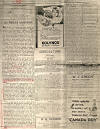
|
19 October
1929.
The
Bluefields Weekly,
p. 2.
"Our
National Government. ¶ By R. M.
Hooker. ¶ As a people we Nicaraguans
have hardly any concept of what our
National Government should mean to us.
We are inclined to be reactionary, to be
too quick to overthrow an existing order
of government and to endeavour to
substitute a new one. As a people we
fail to grasp the political meaning of a
true democracy, and to realize how
utterly impossible it is for us to
achieve this end unless we support our
government. Senor de Madriaga, the great
Spanish thinker, classifies the entire
Latin race as too passionate and given
to making rapid decisions without much
sound thinking. To a certain extent we
agree with this philosopher, for we have
witnessed this tendency to revolt and
stir ill feeling among our citizens. ¶
Our country is at present passing
through a crisis. The crisis is none the
less serious because of the fact that
bloodshed has been avoided. We must now
exercise great care or our attempt at
progressive legislation will fail. We
possess one of the finest constitutions
that can be found in the world. We have
able men in the important positions in
our government. ¶ One great Latin
American writer claims that the best
form of government for the Latin race is
a benevolent dictatorship with an able
man at its head, until the people can be
taught the principles of
self-government. There is much on the
side of the writer. He has the thirty
four year dictatorship of Porfirio Diaz
in Mexico. No government in that country
since 1910 has surpassed the guidance of
this President. Then, look at Italy. It
is true that Mussolini has loosened his
grip to a certain extent but he had to
organize the government, and to do this
he placed himself at its head. Then
there is Spain with Primo de Rivera,
better governed than she has been under
any other administration in the last
thirty years. We are also familiar with
the Zelaya regime and if we choose to be
open-minded we must admit that with all
his faults Nicaragua had in Zelaya a
fine leader. ¶ Today we are led by a man
of deep vision, a thinker, a
philosopher, a gentleman, but a man who
none the less is possessed of the
determination to work out his country’s
good. No man who has occupied the
presidential chair ever had greater
worries than has President Moncada. He
has to fight opposition from abroad,
opposition from the Conservative ranks
and opposition from the Liberal ranks as
well. Some criticize him for his
inability to make Nicaragua anew
overnight. Nicaraguans, from aristocrat
to peasant , should now exhibit the
finer characteristics of true patriots,
and, standing behind their leader, aid
him in this his supreme task. ¶ We on
the Atlantic Coast are indeed fortunate
in the fact that we are so situated that
we can organize our people to vote en
bloc and almost sway any political
program we desire. This one factor we
should never forget. We hold the key to
many great issues that are to come up in
our plan to organize a strong national
Government. Costeños from now on are
going to know the why and the wherefore
of everything. We are going to demand
better legislation. We stand firmly for
the present government and we intend to
see that we are not quietly pushed aside
when the time for general reconstruction
and modernization comes. Of a change for
the better we are confident. We on the
Coast must play an important part in the
grand forward march. Let it be plainly
understood, however, we shall endeavour
to secure our rights by constitutional
means. In vain will revolutionists of
the future look to the Coast for help."
|
|
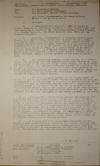
|
21 October
1929.
Navy Cross, Recommendation for Award to
Major Harold H. Utley, USMC. 2nd
Endorsement, from the
Commanding
General W. C. Neville, Managua,
to the Major General Commandant John A.
Lejeune, Washington D.C.
"1. Returned. ¶
2. In accordance with paragraph three of
the basic letter there is no information
available on this subject other than
that contained in letter of the
Commanding General, Second Brigade, U.S.
Marine Corps, No. 300-JBH-6d dated 26
June, 1929, and the accompanying papers.
¶ 3. Since the recommendation of
Brigadier general Logan Feland, U. S.
Marine Corps, in the case of Major
Harold H. Utley, U.S. Marine Corps,
enclosed with basic letter, refers
entirely to services performed prior to
events referred to in the letter of the
Commanding General. I am of the opinion
that the award of the Navy Cross to
Major Harold H. Utley, U. S. Marine
Corps, in accordance with the
recommendation of Brigadier General
Logan Feland, U. S. Marine Corps, and
approved by Rear Admiral David F.
Sellers, U.S. Navy, Commander, Special
Services Squadron at the time, should be
made. ¶ 4. The Commanding General,
Second Brigade, U. S. Marine Corps, was
convinced that the apparent disagreement
between Mr. John McKay, manager of the
Bragman’s Bluff Lumber Company, and
Major Utley and other Marine Corps
officers could most quickly and
efficiently be checked by transferring
Major Utley and certain other officers
to other duty and substituting for them
officers with whom Mr. McKay had no
acquaintance, and this action was
accordingly taken in the interest of
harmony at Puerto Cabezas. ¶ 5. The town
of Puerto Cabezas is practically under
the control of the Bragman’s Bluff
Lumber Company and under these peculiar
circumstances I do not consider it
advisable to keep an officer
continuously on duty as commanding offer
there for a longer period that from six
months to one year. At the time of the
transfer of Major Utley from the Eastern
Area to the Southern Area he had been
continually on duty in the Eastern Area
for fourteen months and was due for
transfer for other duty regardless of
the events narrated in the letter. ¶ 6.
Subsequently a letter on the subject was
received from H. A. Murphy (enclosed),
which is self-explanatory. On 4
September, 1929, Major S. G. Moore, U.S.
Army Reserve now on active duty in the
Office of the Chief of Engineers, and
who was employed an engineer in Northern
Nicaragua during the period covered by
the investigation by the Brigade
Inspector, called and stated that the
object of his visit was to endeavor to
right a wrong done to Major Utley in
relieving him of his command. He
condemned Mr. McKay, the complainant, in
strong terms stating that the charges
were framed up, and stated that he was
present on various occasions stated by
Mr. McKay and that there was no
disorder, drunkenness, or improper
conduct. ¶ 7. It is requested that any
further information on this matter at
hand or obtainable be furnished this
office, together with your comment, and
recommendation as to further action in
regard to the withdrawal of approval of
recommendation for the award of the Navy
Cross. Forward your reply through the
Special Service Squadron Commander. ¶ W.
C. NEVILLE."
|
|
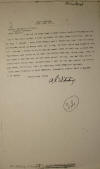
|
23 October
1929.
Letter from A. E.
Webster, Cape Gracias, to Major
C. H. Metcalf, Puerto Cabezas.
"Dear Major:- ¶ I
got up to Sang Sang 8 days after leaving
Bragman Bluff, and a few days before I
left up there to come down this trip,
two of my men, ( Sambos ) came from
Bocay, and I found out that what we
heard of Pedrón being in Bocay were all
l--es, in fact these men reports that he
( Pedrón ) seems to be dribbling away,
and he only has a very few followers,
and seems to be more in hiding than any
thing else, that he had sent a few men
out to the main river, to tell the
natives to go ahead with their work
(plantations ) that he did not expect to
bother any more, certainly, this is
hear-say from mosquito Indians. ¶ WIth
best regards to Capt Shearer, Linscott,
Lewts- Hall & Benson & Dr Baker ¶ Yours
very truly [signed] A. E. Webster"
|
|
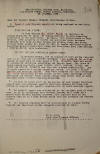
|
24 October
1929.
Memo from Area
Intelligence Officer 1st Lt. W. C. Hall,
Puerto Cabezas, to Brigade
Intelligence Officer Capt. Reagan,
Managua.
"1. Special
intelligence agents are being employed
as set forth below: ¶ CAPE GRACIAS A
DIOS: ¶ At Cape Gracias Mr. Albert
Fagot, an American, is acting regularly
as agent and making periodic reports
regarding conditions on the Coco River.
Mr. Fagot, with headquarters at Cape
Gracias, owns property at WASPUC and
maintains close business relations with
many natives living and working along
the river; through these people Mr.
Fagot is able to render excelled reports
regarding general conditions along the
Coco River from CAPE GRACIAS A DIOS to
BOCAY, both inclusive. ¶ THE PIS PIS AND
CONCEPTION MINING AREAS: ¶ Lieutenant
Benson, now in command of both marine
outposts (one at LA LUZ, one at NEPTUNE
(BONANZA)) has employed two native
agents to make more or less regular
trips to north, west and south to
personally ascertain conditions and
report them. The route of these agents
regularly cover WASPUC, BOCAY, GARROBO,
CASULI, and QUEPI and POTECA, GUIGUILI
and TUMA are visited occasionally. One
of these agents is a native traveling
doctor, the other a native peddler and
merchant trader. They were selected for
their reliability, their friendship for
the marine forces, their knowledge of
the territory and because their normal
occupations permit them to make extended
tours without exciting suspicion. ¶ 2.
It will be noted that the boundaries of
each agent’s territory extend into the
adjacent agent’s territory thereby
enabling this office to compare one
agent’s reports with at least one other
report. ¶ 3. No special agents are
maintained in the southern part of this
area, as it is considered that Colonel
Marston will cover that sector with
Guardia agents; moreover, the southern
half of the Eastern Area is in a more
stable state than the northern and
western parts. ¶ 4. All reports received
will be incorporated in routine weekly
reports and important matter promptly
reported by radio. ¶ W. C. HALL, ¶ Area
Intelligence Officer."
|
|
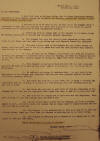
|
1.
25 October 1929.
Memo To All Employees,
Bragmans Bluff
Lumber Company, Puerto Cabezas,
p. 1.
"TO ALL
EMPLOYEES: ¶ I have just seen a circular
letter that is being distributed amongst
employees of this company urging you to
assist the Mosquito Indians who refused
to load bananas Sunday, October 20th. ¶
I believe it to be my duty to you, as
well as to the Company which I represent
to urge that you consider the facts that
I present to you before you allow
yourselves to be influenced by such
inflammatory appeals. ¶ 1. There has
been no change made by the Company in
the rates of pay or working conditions
to justify any discontent amongst
employees. ¶ 2. The Company has been for
several years improving living
conditions in its farms and each year is
providing more and improved houses for
employees. ¶ 3. You must realize that if
the bananas are not loaded aboard the
ships, that they will not be cut in the
farms and that the farm laborers will
suffer a loss as well as the Company. ¶
4. You, as well as the Company, will
suffer loss from any cessation of work,
you perhaps to a greater extent than the
Company, for what the Company may lose
in one way, they will largely regain by
saving the wages that would otherwise be
paid to you. ¶ 5. This Company is paying
as much and more for the same class and
quantity of work as is paid by any other
company in the Banana business in or out
of Nicaragua. ¶ 6. No employee nor group
of employees have ever presented to the
Management of the Company any complaint
that has not been promptly handled and
when justified, promptly settled. ¶ 7.
Ask those who urge you to quit work, who
is going to furnish you employment and
who is going to provide you with
housing, food and clothing while you are
out of work? ¶ 8. Ask those who urge you
to quit work if they are employees of
the Company and if they are not
employees what right they have to ask
you to quit your job? ¶ 9. The ones who
are urging you to quit work are not
employees. They have nothing to lose and
perhaps they may gain a job. ¶ 10. If
you do not want to work for the Company,
you have a perfect right to quit. If you
do quit, the Company has an equal right
to employ another man for the job that
you give up. ¶ 11. The Company is not
advising you to quit your work or to
move out of your house. Someone other
than the Company is advising you to do
those things. ¶ 12. The Company is
advising you to remain in its employ and
to continue to work and draw wages. ¶
Whose advice are you going to follow? ¶
BRAGMANS BLUFF LUMBER COMPANY . . . "
|
|
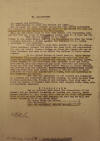
|
2.
25 October 1929.
Memo To All Employees,
Bragmans Bluff
Lumber Company, Puerto Cabezas,
p. 2.
[In English]
"TO NICARAGUANS ¶ The moment has
arrived . . . ¶ The exploitation of
labor has touched its limit . . . . ¶
Now is heard the clear trumpet
announcing with lively enthusiasm the
liberty of the laborers and the death of
the tyrant who with the scepter of
capital oppresses the Nicaraguans. ¶
Such are the words which at this very
moment with resounding echo and all with
one voice we Nicaraguans should sing as
we hear the cry ¶ ‘War and the defense
of our Rights’ ¶ flung to the skies
Sunday last by the Mosquitoes who like
the large nations declared a strike
against the colossus who is taking
advantage of our humility. ¶ To this
hour we have done nothing to make the
authorities complain, because the strike
has been quiet and respectable but yes,
we should throw a stigma on those who
ignore the cry of their brothers and
make of no effect the defense of their
sacred rights. ¶ In the United States of
North America, where George Washington
like a real patriarch knew how to raise
and keep in place the sacred flag of
liberty and justice, the laboring
classes, honest keepers of his
doctrines, with gestures clear and
worthy know how to defy the abuses of
the large factories and companies, which
are like the Bragman Bluff Lumber
Company in Puerto Cabezas, and pretend
that the operator, should earn his food
with hard labor, wishing to deprive them
of their pleasures to which all humans
have a right, each one according to his
condition (or means). ¶ Now that the
destinies of our country are regulated
by a humble but dignified son of the
country, we think in good time he will
appreciate the forces of our brothers,
that only want to break the chains of
slavery with which that company holds
them, paying miserable salaries. ¶
NICARAGUANS: ¶ Let us confront with
honor the necessities of the moment, let
us dedicate ourselves to hunting and
fishing, which nature provides in this
place, will give us our daily
subsistence which is all we gain from
that company, in that way we will not
permit ourselves to be exploited more. ¶
The Union makes the forces . . . . . ¶
Live Nicaragua . . . . . ¶ Live the
President, General Moncada . . . "
|
|

|
3.
25 October 1929.
Memo To All Employees,
Bragmans Bluff
Lumber Company, Puerto Cabezas,
p. 3.
[En Español]
|
|
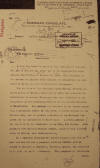
|
29 October
1929.
"Sandino Propaganda." Report from
Samuel J.
Fletcher, American Consul,
Bluefields, to Sec. State, Washington
D.C., p. 1.
"SIR: ¶ I have
the honor to refer to this consulate’s
dispatch No. 109 of October 22, 1929,
and to the Department’s telegraphic
Instruction of October 23, 1929, with
reference to the attempt of Augusto
Cesar Sandino to circularize the east
coast of Nicaragua with revolutionary
propaganda. ¶ Two packages of the
circulars dated Merida, Yucatan, United
States of Mexico, September 6, 1929, and
addressed to individuals in eastern
Nicaragua have been delivered by the
recipients to the Commanding Officer of
the Guardia Nacional at Bluefields. One
package was received by Dr. Onofre
Sandoval, a prominent lawyer of this
port, a former General in the Liberal
Army, and at present a Senator in the
National Congress for the Department of
Bluefields. A second package was
received by the Commandante de La Cruz,
Rio Grande. Both packages bore Mexican
Postage Stamps, canceled with a rubber
stamp at Merida, date undecipherable. ¶
In a separate wrapping Dr. Onofre
Sandoval received by mail via New
Orleans a pamphlet entitled SANDINO ANTE
EL COLOSO by Emigdio E. Marabots,
Veracruz, Mexico, and published by L. &
M., S. en C. – Veracruz. This pamphlet
of thirty-six . . . "
|
|
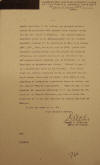
|
29 October
1929.
"Sandino Propaganda." Report from
Samuel J.
Fletcher, American Consul,
Bluefields, to Sec. State, Washington
D.C., p. 2.
" . . . pages,
according to the author, was prepared
after a number of interviews with
Augusto Cesar Sandino during the
latter’s visit to Veracruz. The author
presents Sandino’s views on the
Byran-Chamorro Treaty, reports Sandino’s
version of his activities in Nicaragua
during 1926, 1927, 1928, and early part
of 1929, quotes from Sandino’s
correspondence with Nicaraguan and
American officials, and inserts copies
of his letters to the Anti-imperialistic
Congress held at Frankfort, to the
President of Argentina and others.
Posted to page 1 is a typewritten sheet
of corrections. This sheet bears the
written signature of ‘A. C. Sandino’ and
his usual rubber stamp seal (a bandit,
with sword in air, preparing to
decapitate a prostrate American marine,
and the caption ‘Patria Y Libertad’).
Upon receipt of the pamphlet Dr.
Sandoval delivered it to the Commanding
Officer of the Guardia Nacional, and
that official has forwarded it to the
Jefe Director of Guardia Nacional at
Managua. ¶ I have the honor to be, Sir,
¶ Your obedient servant, ¶ Samuel J.
Fletcher, ¶ American Consul."
|
|
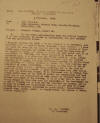
|
4 November
1929.
Mosquito Crisis, report of. From
F. G. Patchen,
by direction from Jefe Director
GN, to Major C. H. Metcalf, Bluefields.
"1. The following
communication from the Private Secretary
of the President, is quoted in
translation, for your information and
appropriate action: ¶ ‘Managua, October
16, 1929. – To the General D. C.
McDougal, Jefe Director, G. N. – Campo
de Marte, Managua. – Dear General: - I
have the honor to quote you the copy of
what the Jefe Politico of Bluefields
says regarding the crisis through which
the Mosquitos of the region of Monta,
are going, in order you will order what
it is convenient: - ‘Obeying your order
expressed in letter of 4th September
last, I am directing the Police Agent of
Monta, asking his information regarding
the crisis through which the Indians
complain to be going, and this
functionary answers the office which I
am quoting: -- ‘Manta, October, 1, 1929.
– Sr. Jefe Politico and Commandant of
Arms, Bluefields. – In reply to your
note of the 23 September last, I have a
critical condition due to the lack of
work and to the bad harvest of their
plantations this year reason why they
are suffering hungry. To my judgment
what is making this people suffer more
is the lack of powder and ammunitions
and lead which due to the regulations on
same cannot be obtained here. The
Indians live most of the hunting. It is
truly that we are suffering hungry in
this city even the employees of the
Government for we are in October and we
have not yet received any salary, and as
we have to attend our obligations there
it is not time to attend fishing or to
dedicate ourselves to plantations. –
Respectfully, - Eugenio Rose, Police
Agent.’ – Respectfully, (s) Carlos A.
Bravo, Private Secretary.’ ¶ F. G.
PATCHEN, ¶ By Direction."
|
|
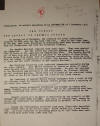
|
7 November
1929.
"The Defeat of General Duarte,"
La
Información, Bluefields
(translation).
"On Sunday, 3rd
of November, the election for local
authorities occurred in this city for
the term 1930-1931. This is the first
time, we can say, that Local Elections
in Bluefields have been carried through
with all cleanliness and with the
strictest liberty. ¶ The Guardia
Nacional complied with their duty. They
were neutral and impartial. All the
voters had complete liberty and
guarantee to vote in favor of the
candidate he sympathized with. The
Guardia Nacional of this city have
gained the applause of the people of
Bluefields. We make known this detail
with the greatest satisfaction, while we
tribute our homage of admiration to
Colonel John Marston, to Captain Chester
A. Davis and the other officers of the
Guardia Nacional. ¶ The Electoral
Directors also conducted themselves
correctly during the civic contest. Both
the favorers of Duarte as those of
Connor could deposit their votes without
any impediment. We give our applause to
the Directors and especially to the
Presidents, Dr. Plutarco Rostran and Mr.
Leonidas Mayorga. There were 419
citizens at the electoral boxes. 237
voted at the North Canton and 192 voted
at the South Canton. ¶ The Candidacy of
General Eliseo Duarte triumphed with a
total of 289. 130 citizens voted for
General Nasman Connor, giving Duarte a
majority of 159 votes over Connor. ¶
General Duarte strenuously celebrated
his triumph on Sunday with bombs,
rockets, yells, music, and liquor. But
in our conception what Gen. Duarte
celebrated was his political funeral, if
you will permit us the phrase. ¶ General
Duarte will be Major of Bluefields by
the goodwill of TWO HUNDRED AND EIGHTY
NINE CITIZENS. And this, is clearly
seen, cannot be called the legitimate
and genuine expression or goodwill of
the city of Bluefields. ¶ During the
Presidential elections last year,
Bluefields deposited 1438 liberal votes
in the ballot boxes. North Canton 739,
South Canton 699. In local elections of
preceding years up to 1927 votes were
cast. The votes have never been lower
than 800."
|
|
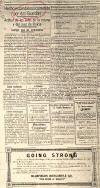
|
1.
9 November 1929.
The
Bluefields Weekly, p. 1.
"Hecho
escandaloso cometido por dos Guardias.
¶ El Miércoles 6 de los Corrientes, a
las diez de la noche, los individuos
José Abraham León y Manuel Zelaya,
Guardias Nacionales ambos, obligaron a
los chinos de la casa de comercio “Law
Pan” situada en la esquina de las calles
Hodgson y Las Casas, frente al Colegio
de La Divina Pastora, a que les abrieran
las puertas del establecimiento, donde
se introdujeron, tomaron licor, poterías
y otros artículos de la tienda. ¶ Cuando
el dueño del establecimiento vió que su
casa estaba siendo saqueada por los
guardias del orden, corrió a dar parte
de lo ocurrido a casa del Señor Juez de
Policía don Baltazar Gómez, que dista
como cincuenta metros de la casa
saqueada y quien inmediatamente se puso
en marcha, habiendo encontrado en el
corredor de la casa cuyas puertas tenían
abiertas, a los dos Guardias Nacionales,
quienes muy frescamente cenaban con los
productos de lo que acababan de robar. ¶
En presencia de lo ocurrido, el señor
Juez Gómez se dirigió en busca de los
jefes de la Guardia, encontrándose con
el Capitán Amor Sims, al que puso en
autos de lo que sucedía, y quien,
incontinenti, se puso en marcha, en
busca de los delincuentes, habiéndolos
capturado momentos después. ¶ Al día
siguiente por la mañana, el señor Juez
de Policía informó al Jefe de la Guardia
Coronel Marston, de todo lo ocurrido,
dando cuenta al señor Juez de lo
Criminal del Distrito, para el debido
enjuiciamiento de los delincuentes. ¶ El
Coronel Marston mandó despojar
inmediatamente a los guardias
delicuentes, imponiéndoles severos
castigos disciplinarios para ejemplo de
sus compañeros, poniéndoles a
continuación, a la orden del Juez de lo
Criminal del Distrito. ¶ Es de aplaudir
la actitud del señor Juez de Policía don
Baltazar Gómez, así como la de los Jefes
de la Guardia y especialmente la del
Coronel Marston, quienes proceden con
verdadero celo y actividad al castigo de
los delincuentes, siendo más severos con
los miembros del cuerpo a ellos
encomendados para garantía de la
sociedad. ¶ Encarecemos muy
especialmente al activo Capitán Davis,
la vigilancia de la ciudad después de
las diez de la noche, especialmente en
la parte menos central , que está más
expuesta a los malhechores."
|
|
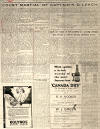
|
2.
9 November 1929.
The
Bluefields Weekly, p. 2.
"Court Martial of
Captain R. D. Leach. . .
(continued) . . . ¶ . . . with reference
to the question of instructions from
Col. Marston on the making of raids,
clearing (sic) up vagrants, etc., I can
certify that in my position as police
Judge I gave Capt. Leach instructions to
the streets cleared of loafers according
to law. If these orders are according to
law, I believe Col. Marston knows of
them. In answer to the question if Col.
Marston did to my knowledge and in my
presence complain of these instructions,
I do not know if he was present, but he
was in agreement with the arrest of
loafers. In his capacity as Chief of
Police Capt. Leach did have authority to
arrest loafers. In answer to the
question if head authority to arrest in
his capacity as Departmental Commander
of Southern Bluefields (reply to
question was not heard). ¶ The law
regarding persons being out on the
streets is that in time of martial law
no one may walk the streets after hours.
In time of peace all persons may walk in
the streets all night, except suspicious
persons. In conformity with the law all
dances in public and private houses may
go on until 10 p.m. After that they have
to pay a tax to the Municipality and the
Board of Charity. This does not apply to
clubs. There they may dance till 12 p.m.
On the morning of the 31st of August
this year Carlos Morales, Francisco
Cabrera and Hernan Cortez were not
brought to me. ¶ CROSS EXAMINED
BY THE PROSECUTION. ¶ On or
about the 31st of August the city of
Bluefields was not under Martial Law. ¶
The witness received the usual caution
not to discuss the evidence. ¶
CHESTER ARTHUR DAVIS. ¶ Chief
of Police of Bluefields, testified as
follows:- I recognize the accused as
Capt. R. D. Leach. I have been in
Bluefields since the 3rd of August. I
perform the duties of Chief of Police
and Prison Officer, chiefly under the
supervision of Capt. Leach. I am in
charge of the Police Guard on the
Streets. The Police are armed with 38
caliber pistols. Ammunition is issued
when they are going on duty. Young
Springer’s reputation is not good. His
name is Franklin, Capt. Leach did prefer
charges against Springer, Cortez, Sierra
and Cabrera on the morning of the 31stt
of August, 1929. They were not taken
before the Police Judge. They were
released by the orders of the Area
Commander, before a thorough
investigation was held. ¶ The witness
received the usual caution. ¶
MR. J. M. O’BRIEN (JR), sworn,
testified as follows: I am resident in
Bluefields and am Cashier for the United
Fruit Company. I recognize the accused
as Capt. Leach. I saw him on the night
of the 30th August at the Atlantic
Hotel. He was perfectly sober. I have
known him for about 6 months. I have
known him as possessed of a reputation
for sobriety and peacefulness and
coolness. ¶ BY THE COURT.
I do not know what he was doing between
the hours of 12 and 2 on the night of
August 30th. ¶ The witness received the
usual caution. ¶ CAPT. A. LE R.
SIMS of the National Guard was
taken as a witness in order to produce
G.O. No. 41 of the national Guard, dated
Sept. 1927; also No. 22 dated 1st August
1927. ¶ LIEUT BOLES of
the National Guard was then called to
state his knowledge of certain facts in
connection with a charge brought some
time ago against a member of the
National Guard for unjustly shooting and
killing a prisoner whom he was sent to
apprehend at Rio Grande Bar. He stated
that on the Guardsman being tried he was
acquitted and that the finding of the
Court was approved by the Area
Commander. ¶ This closed the case for
defence. ¶ The accused then read his
statement which follows here: ¶
WRITTEN STATEMENT READ BY THE ACCUSED
¶ In submitting my case I am willing to
accept the decision of the court on the
evidence adduced. On the night of August
30 and 31, 1929, I felt that my official
capacity of Department Commander
required certain action on my part.
After having been involved in a small
brawl which was forced upon me against
my will, I confined some of the persons
involved and took official action
towards apprehending others. This lead
to the arrest of Sierra and his escape.
¶ After calling upon him to halt, and
there being no other means to prevent
his escape, I fired my pistol in an
attempt to cause him to stop. At this
time no other method appeared to offer
any likelihood of success, and in my
position as an officer of the marine
Corps and of the Guardia Nacional I felt
called upon to take extreme measures in
the maintenance of law and order by
attempting to prevent the escape of my
prisoner. While the remaining prisoners
were being confined one H.F. Springer,
junior, became abusive and caught hold
of me, forcing me to use force before he
allowed himself to be properly confined.
¶ With regard as to whether or not I was
justified in making these arrests, I
believe it is common knowledge that any
Guardia Officer is justified in making
an emergency arrest anywhere in
Nicaragua. The court’s attention is
respectfully invited to my military
history which is in evidence before this
court. RALPH D. LEACH,
First Lieutenant, U.S. Marine Corps. ¶
WRITTEN OPENING ARGUMENT OF THE
JUDGE ADVOCATE ¶ The court has
been furnished with a complete
transcript of the testimony given before
it with the exception of that of the
witnesses who have appeared this
morning. That (?) I am sure fresh in the
memory of the members. All members have
had ample opportunity to read the report
carefully. It is therefore unnecessary
for the judge advocate to make a
detailed summary of the evidence. The
judge advocate considers that it would
be presumptuous to him to attempt to
influence of him to advise the court on
the exercise of that function, which
belongs to the court alone; the weighing
and evaluating of evidence. He will
therefore continue his remarks to a
consideration of the legal aspect of
this case. ¶ In respect to the first
charge and the specification there under
little need be said regarding the law.
No accurate yardstick has yet been
devised to determine what degree of
intoxication will constitute drunkenness
within the meaning of Naval Law. The
decision depends upon the circumstances,
the individual, the (?) Members of the
Naval Service can have no respect for
legal quibbling over technicalities.
Every member knows what is expected of
an officer of the service at any time.
The question for the court is merely,
did the accused act as an officer should
act, and if he did not, was such failure
the result of indulgence in intoxicants.
In arriving at this conclusion the court
may properly consider the opinions of
observers, the actions of the accused,
and their own justifiable inferences. ¶
A decision in the second charge and the
specifications thereunder turns on the
phrase “without justifiable cause.” The
word willfully means at law nothing more
than that the act was committed by an
individual who knew what he was doing
and was a free agent. See naval Digest
of 1916, page 646. The word
“maliciously” is not used in its strict
dictionary meaning. At law it is
presumed that an act is malicious when
that act is wrongful and is done
intentionally. Se Naval Digest of 1916,
page 347, Section 276 of the Penal Code
of the United States prohibits an
individual from striking, beating, or
assaulting another. There are of course
situations where individuals have been
held justified in using force to the
injury of the right of freedom in
person, property, and the pursuit of
happiness which is the basis of all law.
Such justification falls in two
(continued on page 5) . . . "
|
|
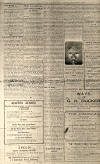
|
3.
9 November 1929.
The
Bluefields Weekly, p. 3.
"Court
Martial of . . . . (continued
from first page) ¶ classes. The first is
self defense and the second the right of
a police official to apprehend
offenders. Both of the justifications
are hedged about by legal provisions. As
a general rule the individual may never
take the law into his own hands. He may,
however, if imperiled, meet force with
force, but then only in an extremity
when no other recourse is available, and
then only to the extent necessary to
secure his own person or property. For a
discussion of this point see naval
Digest of 1916 under the heading of
Manslaughter and under Justifiable
Cause. Incidentally, it is noted that
mere words never justify an assault. A
police official is also compelled by law
to exercise reasonable restraint in
effecting arrests. As a general
proposition he may use only such force
as is actually necessary. At common law
a police official can endanger life only
when an offender is apprehended in the
actual commission of a felony, a felony
being defined as one of the serious
offenses punishable by forfeiture of
life or property, and later as one
punishable by imprisonment in a
penitentiary with the corresponding loss
civil rights. ¶ Is a Marine Officer a
police official within the meaning of
the law? As far as the performance of
his duties within the limits of the
United States is concerned the answer is
definitely no. Not only has the
constitution authorized the organization
of an army and a navy in distinct
paragraphs from those delegating police
powers, but the legislatures have shown
themselves so jealous of the assumption
of police power by the armed forces of
the country that in no case may federal
forces be ordered into a state for the
protection of life and property be
exclusively federal, without the express
invitation of the Governor of the State.
The cases arising out of the Pullman
strikes and riots in Chicago are in
point in this question. ¶ It is conceded
that a member of the military forces of
the United States may absorb certain
police functions when operating outside
the limits of the United States. But he
may do so only when there is an absolute
necessity, and such necessity is
invariably made the basis for the
declaration of military control. In the
Eastern Area of Nicaragua at time of the
commission of the acts now under
consideration by this court the normal
civil authorities were in the full
exercise of their functions. No state of
war existed between the United States
and any other power. Martial law had not
been declared either by the United
States (scarcely a possibility
considering the definition of Martial
Law) nor was a military government in
existence. Under such circumstances how
can a member of a branch of the military
force of the United State justify the
apprehending of a civilian, no matter
with what limited exercise of force, let
alone the use of a firearm in the
prevention of the escape of such a
prisoner? But let us assume that
military necessity justified the arrest,
in the extent that it justified a
military official in assuming the
functions of a civil official. Is not
such official, when performing a civil
act, compelled to observe the law
governing the conduct of civil
officials? ¶ In this particular case
however the accused was a member of the
Guardia Nacional of Nicaragua performing
duties in accordance with an agreement
between the United States and Nicaragua.
Any officer of the National Guard of
Nicaragua is both a military and a
police official, the first when military
necessity such as the presence of armed
bandit bands of other groups hostile to
the government demands, the second
exclusively when there is no such
necessity. In Bluefields on or about
August 31, 1929, the Guardia Nacional
was performing police duty exclusively.
It is conceded that the accused in his
capacity as a police official had a
right to make arrests. ¶ However, if he
relies on his duty as a police official
to justify his interference with the
freedom of civilians he must be held
responsible for the observance of the
regulations made by proper authority for
the guidance of police officials of
Nicaragua and such regulations
specifically forbid the use of firearms
in the making of arrest of civil
offenders unless such offenders be armed
and the life of the officer is in
danger. ¶ The accused is being tried
under the laws of the United States it
is true, and in the last charge
specifically under the twenty second
article for the government of the Navy.
Nevertheless since that article includes
offenses not specifically mentioned
elsewhere and covers the violation of
state, federal, and municipal law, it is
contended that evidence that the accused
violated Nicaraguan law in his conduct
as a police official is sufficient to
establish the charge. ¶ HARVEY
B. ALBAN. First Lieutenant,
U.S. Marine Corps, Judge Advocate. (To
be concluded next week)."
|
|
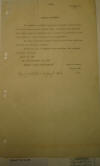
|
11 November
1929.
Sandino Situation, Handbills by Sandino
in Bluefields & Puerto Cabezas,
Major Fred T.
Cruse, San José.
"The enclosed
handbills by Sandino appeared at
Bluefields and Puerto Cabezas about
October 21st. As Sandino was admitted
into Mexico upon his agreement not to
indulge in political activities, this is
a clear violation of that agreement. ¶
In these circulars he again attacks
Adolfo Diaz, Emiliano Chamorro and Jose
Maria Moncada. ¶ Toward the end of
October these circulars also appeared in
Corinto and Leon. ¶ Report No. 559 ¶ . .
. Source - Native Intelligence. . . .
[handwritten note at bottom:] Copy of
hand bill on MC Digest - 30 20"
|
|
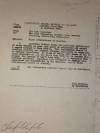
|
14 November
1929.
Party Affiliations of Guardia.
Memo from Jefe
Director GN, Managua, to Major C.
H. Metcalf, Bluefields.
"1. Ascertain
without delay the political affiliation
of every Guardia in your Area prior to
enlistment and submit a report thereof
to this office. This information should
be obtained secretly and without
arousing curiosity or suspicion or
causing uneasiness. In cases of doubt,
give names of men to these Headquarters
(in the event they enlisted in Western
Nicaragua) for inquiry at man's home
town. It is suspected that Civilian
political agitators have attempted to
corrupt Conservatives and Chamorristas
in the Guardia. Men of these
affiliations should be watched. ¶
2. All information relative hereto will
be considered
SECRET." [NOTE:
The order to destroy the "Secret Files"
in late 1932, just before the Marine
Corps withdrawal, suggests that these
"secret party affiliation of the
Guardia" files were destroyed.]
|
|
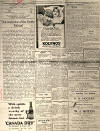
|
1.
16 November 1929.
The
Bluefields Weekly, p. 1.
"Nationalization
of the Railroad ... "Moravian School
Notes ... The Harvest Festival of the
Moravian Church"
|
|
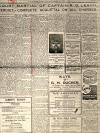
|
2.
16 November 1929.
The
Bluefields Weekly, p. 2.
"Court Martial of
Captain R. D. Leach - Verdict Complete
Acquittal on All Charges . . .
". . . Mention has been made of “res
gestae”. I submit that the remarks made
to Mr. Kirkwood to the effect that he,
Lieutenant Leach, had been set upon by
ruffians is competent evidence to show
the character of the incident referred
to, and as such cannot be lightly
disregarded. ¶ Please note the personal
appearance of the various witnesses for
the prosecution as compared with the
appearance f the witnesses for the
defense. The witnesses for the defence
include the most reliable citizens of
Bluefields, both American and
Nicaraguan, as well as persons from
other classes of life. ¶ With regard to
the wounding of Sierra I refer the court
to his own testimony. He admits that he
was in the act of violating the laws of
the city, when apprehended. He admits
that he attempted to escape. ¶ Place
yourselves in the position of Lieutenant
Leach that night. You are Department
Commander and among other things are
responsible for the preservation of good
order in this city. On your way home
from a dance you are set upon by thugs.
In your official capacity you proceed to
round up all suspicious characters on
the streets. You discover a group
lurking on the streets at an early hour
of the morning in violation of well
known regulations for the conduct of
inhabitants. You do not know who they
are. They may be bandit agents, they may
be escaped convicts; true, they may be
peaceful citizens but in any case they
have no right to be lurking in dark
corners at that hour. Of course it later
developed that they were not bandits but
that fact was not known at the time.
However one of this group has been shown
to be a habitual thief, who by his own
confession was on the streets at that
hour “searching for food”. In
conformance with the spirit of the major
mission of the Guardia Nacional, namely
the maintenance of law and order
throughout the length and breadth of
Nicaragua, you arrest them all and one
attempts to escape. Immediately your
worst suspicions are justified. You call
upon him to halt; he does not stop. I
claim that any marine officer with any
pride in his profession would at this
point exert every means in his power to
stop this escaping criminal: I say
criminal for escaping from arrest is not
a mere misdemeanor but is in itself a
felony. Would any o f the officers of
this court have permitted him to escape
unmolested? The regulations of our
service provide for just such
occurrences: the regulations require
that the escaping prisoner be fired
upon. The orders are: “If a prisoner
attempts to escape the sentinel will
call HALT. If he fails t halt when the
sentinel has once repeated the call, and
if there is no other possible means of
preventing his escape, the sentinel will
fire upon him.” Also: “Every man of the
guard should do his part in detaining a
prisoner who attempts to escape”. ¶
These orders for sentinels certainly
apply with full force and effect to
officers in the performance of their
duty. ¶ How long would the dignity and
honor of the marine Corps be upheld if
these particular orders were relaxed? In
cases such as the one now in issue it
has been held that the firing is done
under the performance of an obligation
to prevent the escape y any means, and
that the shooting in such a case
constitutes no offense for it is a
lawful act. ¶ If the escaping prisoner
in this case had been a well known
bandit chief Lieutenant Leach would have
been decorated for his actions. Just
because this man happened to be a mere
thief, does the same act resolve itself
into a crime? ¶ From an impartial study
of the record of proceedings I find that
certain facts have been established. It
will be noted that this very brief
summary includes the entire prosecution
as well as the defense. ¶ Colonel
Marston stated that conditions were
quiet in this vicinity and the primary
function required from the Guardia here
was merely that of civil police. No
matter what local conditions seem to
indicate the primary mission of the
Guardia Nacional is the suppression of
banditry and the maintenance of law and
order: the methods used are as varied as
the immediate circumstance of each
incident require. You cannot arbitrarily
state this or that—each case must be
handled as the judgment of the persons
on the scene indicate. ¶ I will not
impose on the time of the court by
discussing the charge of drunkenness.
That has been fully covered by
testimony, most of which has been
emphatically to the effect that
Lieutenant Leach was not intoxicated.
The testimony of Policarpo Mercado only
brought out the fact that there was some
trouble between one Cortes, one
Springer, and Lieutenant Leach. This
incident is better described by Jose
Antonio Andeo who clarifies the
situation by showing that Springer was
the aggressor –not Lieutenant Leach.
Next we reach the testimony of Francisco
Cabrera . He testified to Sierra’s
arrest and to incidents at the jail. It
will be noted that the material
averments of the second specification of
the second charge are not mentioned. The
arrest “of this witness” testimony will
be considered in connection with that of
other witnesses. Doctor Belding
testified as an expert. The substance of
his testimony was to the effect that he
examined one Daniel Sierra the latter
part of August and that Sierra had a
bullet wound cause by a hardened or
jacketed bullet of about 38 calibre. It
is noted that this wound scar is not
shown to have any direct bearing on this
case except by implication. ¶ Before
discussing the testimony of Sierra I
wish t invite the court’s attention to
certain facts; at the time of his arrest
“Sierra was drunk, very drunk.” I cannot
reconcile this fact with his apparent
ability to remember everything that
happened on the night in question. Also
Sierra has a bad character and
reputation, the local judge here knew
him and has testified “that the truth is
not in him”. ¶ Sierra admits his
offenses and his escape and appears to
believe that he should have been allowed
to escape unmolested. Please notice that
both Sierra and Cabrera testified very
positively and in detail as to certain
incidents but their stories do not agree
in many particulars. Both apparently
hold a grudge against Lieutenant Leach
which is apparent by their manner of
testifying and have also lessened the
weight of their testimony by failing to
confirm each other’s story. The story
told by Sierra is most improbable which
can easily be explained by his
unfamiliarity with the truth in addition
to his drunken condition. Sierra made
much of a wound upon his head which has
been described by the hospital corpsman
who treated it as a “scratch”. ¶ I have
already touched upon the testimony of
Mr. Kirkwood with regards to the affray
in front of the Cuyamel office.
(Continued on page 6)."
|
|

|
3.
16 November 1929.
The
Bluefields Weekly, p. 3.
"Court Martial of
Captain R. D. Leach - Verdict Complete
Acquittal (cont.) . . .
(Continued from page 3) Colonel Marston,
as a witness for the defense, (on page
32 in answer to question 13) set forth a
history of the duties performed by
Lieutenant Leach in Bluefields. After
having been Chief of Police of this city
for some months it is obviously needless
for the Department Commander to
relinquish all control when that duty
was assigned to a junior officer. In the
eyes of the people Lieutenant Leach was
still Chief of Police and as Department
Commander he certainly had certain
rights and responsibility in connection
with the police of the city. ¶ The
testimony of today’s witnesses is still
very fresh in our minds and it is
unnecessary to review it. I ask for a
full and honorable acquittal for charge
one. I ask for a full and honorable
acquittal for charge two on the grounds
that no evidence tending to reflect
adversely on Lieutenant Leach has been
submitted. In fact the testimony shows
that here was an energetic officer
engaged in the duties of his office in a
very able manner. ¶ I ask for a full and
honorable acquittal of charge three for
the reason stated above and also on
account of the fact that specification
two of this charge appears to be an
unwarranted duplication of charges as
well as not being proved at all. ¶
William C. Hall First Lieutenant , U.S.
Marine Corps, Counsel for the accused ¶
WRITTEN CLOSING ARGUMENT OF THE JUDGE
ADVOCATE ¶ The judge advocate merely
repeats that if the accused was acting
as a marine officer under the conditions
existing in Nicaragua at that time, he
had no legal right to make an arrest of
any civilian, let alone to use the
intimated force relying on the usual
orders for sentries over prisoners as
his defense. If the original arrest as a
marine officer were justified then
probably the usual orders for sentries
might apply but where the original
method is unlawful, subsequent adherence
to the form of orders received is not
defense. For a discussion of this
subject see Court Martial Order number
4, Series of 1929. If on the other hand
the accused made his arrest purely as a
local official he is then bound to use
normal and everyday judgment in the use
of force necessary to effect arrest.
Bound by the common law of the United
States not to arrest civil offenders he
cannot justify one half of his act by
reference to another law and then rely
on a provision of the first law to
justify a violation of the second on
which he has already relied. ¶ Harvey B.
Alban First Lieutenant, U.s. Marine
Corps, Judge Advocate ¶ VERDICT OF
ACQUITTAL ¶ Capt. Leach has been
acquitted on all the charges."
|
|
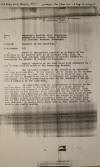
|
1.
22 November 1929.
Cover letter of "An Estimate of the
Situation in the Eastern Area of
Nicaragua To Determine Most Suitable
Disposition of Marines Therein Under
Conditions Existing November 20th,
1929." Report of
Major C. H.
Metcalf, Puerto Cabezas, p. 1.
"Enclosures: (2)
¶ 1. There is transmitted herewith an
estimate of the situation in the Easter
Area as of November 20th, 1929, to
determine the most suitable disposition
of Marines therein to accomplish the
mission of Marines in Nicaragua. ¶ 2.
Marine outposts on the Coco River were
evacuated in May of this year by order
of the Commanding General. ¶ 3. The
enclosed estimate of the situation is
submitted for your consideration. If the
Marines are to remain in the Eastern
Area of Nicaragua for some time to come,
it is believed that our mission can be
accomplished better by changing our
disposition in accordance with the
recommendation made in the decision of
the enclosed estimate of the situation.
¶ 4. In connection with the distribution
of Guardia in the Eastern Area, it will
be noted that there is a large number of
officers and men disposed at Bluefields
and Puerto Cabezas. This disposition is
not believed to be necessary for the
safety of these two points. The
expansion of the Guardia in this area
seems to have been definitely halted by
the fact that men cannot be rationed on
the Guardia ration allowance in certain
parts of the Eastern Area. Due to this
fact certain posts have been withdrawn
and plans have been abandoned to occupy
other posts such as Cape Gracias where
the Guardia are really needed. . . . "
|
|
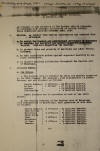
|
2.
22 November 1929.
An Estimate of the Situation in the
Eastern Area of Nicaragua,
Major C. H.
Metcalf, Puerto Cabezas, p. 2.
". . . ¶ 1.
MISSION. As deduced from various
instructions and inferred from
situation. ¶ a. To assist the regular
and acknowledged government of Nicaragua
to maintain law and order and prevent
organized resistance thereto. (includes
supporting the Guardia). ¶ b. To protect
lives and property of Americans and
other foreign citizens. ¶ c. To take
appropriate caution against organized
banditry in any phase encountered. ¶ d.
To collect military information
throughout the Eastern part of
Nicaragua. ¶ 2. OPPOSING FORCES. ¶ a.
Own forces. ¶ 1. The Eastern Area is
occupied by about 100 Marines organized
as the 20th Company, 5th Regiment, with
Headquarters at Puerto Cabezas, and are
disposed as follows: ¶ Puerto Cabezas: 7
Officers - 64 Enlisted Marines, ¶ La
Luz: 1 Officer - 17 Enlisted Marines, ¶
Neptune: - 11 Enlisted Marines, ¶
Prinzapolka: - 2 Enlisted Marines. ¶
Radio stations are in operation at each
of the above places. ¶ 2. The Guardia
Nacional of the Eastern Area of
Nicaragua with Headquarters at
Bluefields, have garrisons in this area
as follows: ¶ Puerto Cabezas: 5 Officers
- 51 Enlisted Guardia, ¶ Wawa Central: -
7 Enlisted Guardia, ¶ Bluefields: 9
Officers - 72 Enlisted Guardia, ¶ Punta
Gorda: - 5 Enlisted Guardia, ¶ Rama: 1
Officer - 15 Enlisted Guardia, ¶
Guadalupe: - 4 Enlisted Guardia, ¶ La
Cruz: 1 Officer - 19 Enlisted Guardia, ¶
Tumarin: - 4 Enlisted Guardia, . . . "
|
|
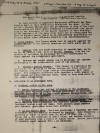
|
3.
22 November 1929.
An Estimate of the Situation in the
Eastern Area of Nicaragua,
Major C. H.
Metcalf, Puerto Cabezas, p. 3.
". . . Rio Grande
Bar: - 8 Enlisted Guardia. ¶ Total: 16
Officers - 185 Enlisted Guardia. ¶ 3.
Duly elected or appointed Nicaraguan
officials are functioning more or less
efficiently throughout the Area. In the
La Luz - Neptune Mining Area the
performance of duty of the local
Commandantes and other civil officials
is supervised when necessary by the
Commander of the Marine outposts in that
vicinity. In the remainder of the Area
where there are no established Marine or
Guardia posts, there is no satisfactory
supervision and in most cases these
officials function very
unsatisfactorily. ¶ b. Enemy forces. The
forces which tend to operate against the
accomplishment of the several missions
set forth above are as follows: ¶ 1.
Sandino with his staff according to
reports has, as recently as October
14th, been in Merida, Yucatan, with the
intention of returning to Nicaragua the
first opportunity to fight against the
established government. ¶ 2. Outlaws and
bandit groups now in Nicaragua are
located principally in the north-central
part of the country. ¶ 3. Possible
racial trouble. This danger is
especially important in the vicinity of
Puerto Cabezas and other points in the
Eastern Area where large foreign
developments have taken place. The
companies concerned have imported a
large number of West Indian and other
foreign labor, which is very much hated
by the native inhabitants. ¶ 3.
SITUATION TO BE CONTENDED WITH. ¶ a.
Critical points in the Area. ¶ 1. Puerto
Cabezas and railway extension to the
northwest. Probably most valuable single
foreign investment in Nicaragua.
Supports population of 10,000 - with
present dispositions, protection in
every way assured. ¶ 2. Foreign
developments in the vicinity of
Bluefields. Two large American Fruit
Companies and numerous smaller
companies. Important Custom House and
Bank. With present large Guardia post
thereat, protection seems well provided.
¶ 3. La Luz Mining Area. What was
previously a valuable American
investment was practically destroyed by
Sandino. Only remaining property of
value is about four (4) miles of pipe
line, a few tools, and a few buildings
of small value; and surface deposits of
gold scattered over a number of square
miles. Native population in vicinity
about seventy five - no Americans. . . .
"
|
|

|
4.
22 November 1929.
An Estimate of the Situation in the
Eastern Area of Nicaragua,
Major C. H.
Metcalf, Puerto Cabezas, p. 4.
". . . 1. Present
disposition which is well known. ¶ 2.
Same as present disposition with
reduction of strength at La Luz, and
establishment of additional post at Cape
Gracias. ¶ 3. Same disposition as at
present with additional post established
at Cape Gracias, taking necessary men
therefore from Puerto Cabezas. ¶ b.
Analyses of plans open to us. The
present plan appears to provide more
protection than is warranted at the La
Luz Mine. As will be noted in paragraph
3 (under sub-paragraph a. 3) above, the
American owned property in that vicinity
is of little value. The pipe line in
question which is the only single item
of any considerable value could be
destroyed only be an enormous amount of
labor or by the use of an enormous
amount of explosives. The proposition of
protecting private property against
individual placer mining and trespassers
does not appear to be a proper mission
for Marines in this country. It is
believed that the parties concerned --
the Fletcher interests, a former
President of Nicaragua, and other
individuals -- should be expected to
provide their own protection in this
connection. As noted above the
population in this vicinity is very
small and would probably be still
smaller if the Marines were removed
therefrom. As long as a post of the
present size is maintained at La Luz a
long and expensive line of
communications must be maintained from
Puerto Cabezas via Prinzapolka and the
Prinzapolka River. It is the opinion of
the Commander, Eastern Area that this
post could be entirely eliminated
without seriously affecting the carrying
out of the mission of the Marines in
Eastern Nicaragua. ¶ Plan 2. By
occupying Cape Gracias an outpost would
be established which would deny that
place to Sandino and other disaffected
individuals who would attempt to use it
as a place of entry into Nicaragua. It
would furnish a convenient base from
which a Marine patrol could board one of
the several available power boats and
proceed up the river to the limit of
power boat navigation. There appears to
be at present little expectation of the
Guardia occupying this region. With
Marines at Cape Gracias the present
menace of Sandino’s return to Nicaragua
would, it is believed, be considerable
reduced. Sandino is known to have
attempted to use Cape Gracias as a base
for distributing his propaganda up the
Coco River. Certain intercepted radios
in the past few weeks have indicated
that other hostile individuals
contemplate the use of Cape Gracias as a
point of return to Nicaragua. ¶ A marine
outpost at Cape Gracias with occasional
patrols up the Coco River could give
considerable supervision to local civil
officials which events in the recent
past have indicated would be necessary.
As a means of assisting to maintain law
and order it is believed that this
outpost could accomplish more than is
being accomplished by the Marine outpost
at La Luz. . . . "
|
|
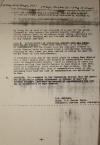
|
5.
22 November 1929.
An Estimate of the Situation in the
Eastern Area of Nicaragua,
Major C. H.
Metcalf, Puerto Cabezas, p. 5.
". . . By using
all or part of the strength of La Luz
for the establishment of this outpost
the present reserve strength at Puerto
Cabezas could be maintained where living
conditions and conditions for training
men are far more satisfactory than in
any outpost position. ¶ Plan 3.
Establishment of additional outpost with
men taken from Puerto Cabezas. This plan
would not, it is believed, be
satisfactory for the reason that the
available reserve at Puerto Cabezas
would be reduced below a satisfactory
strength. Training of men, which has
been carried on during the past few
months would be less satisfactory. ¶ In
connection with any of the above plans
to occupy Cape Gracias with a small
Marine post, the problem of
communication thereto would be
comparatively simply. There is normally
at least one schooner sailing from
Puerto Cabezas to Cape Gracias each
week. There is a commercial radio
station at Cape Gracias. The expense of
maintaining this line of communication
would be considerable less than the line
of communication now maintained to La
Luz. ¶ DECISION. To recommend to the
Commanding General that the garrison at
La Luz be either eliminated or reduced
to half its present strength, and that
an outpost of approximately ten (10) men
be established at Cape Gracias."
|
|
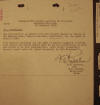
|
23 November
1929.
GN-2 Memorandum from Monthly Record of
Events of Eastern Area for Oct. 1929,
Major F. G. Patchen for
Major W. G.
Sheard, Managua.
"Sandino
circulars and one copy of Sandino
pamphlet received from Mexico via United
States Mail by certain individuals in
Area and turned in to this Headquarters.
Both highly incendiary. Special report
made and copies forwarded to Jefe
Director."
|
|
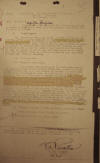
|
23 November
1929.
GN-2 Intelligence Memorandum, Dept. of
Bluefields, Major
F. G. Patchen, Managua.
"1. The following
is an extract from the monthly Record of
Events of the Eastern Area, Guardia
Nacional, Bluefields, for the month of
October: ¶ 2. Intelligence. ¶ (a)
department territory Quiet. A theft of
400 lbs. of blasting powder from the
magazine of the Bragmanns Bluff Lumber
Company was reported. Investigation
shows that the account was probably
considerably less. This powder has been
ground into shot gun powder. The samples
have been secured from Indians who had
purchased it from a man who came to the
farms during the month. The name is
unknown as yet but all evidence points
to an inside job, and, certainly there
is nothing to indicate that the theft is
other than ordinary thieving. ¶ (b)
Military – none. ¶ (c) Economic
conditions. ¶ The strikes took place
among the dock employees of the
Bragmanns Bluff Lumber Company during
the period. The first caused a slight
tie up in the loading of vessels and
some small fights among the crowds in
town. The additional patrols were closed
in town and there were no further
disorders. The following Sunday a
general strike was called by means of a
proclamation a copy of which is
attached. There was no disturbance,
however, and with the exception of a few
extra men in town there was no
appreciable effect from the publication
of the proclamation. Investigation has
revealed that at no time has there been
any material complaint on the part of
the laborers. Three men who are not
employed by the Company in any capacity
organized the first strike and if they
did not write the proclamation calling
for the second at least were
instrumental in posting and distributing
copies. It is believed that the strikes
are not evidence of unrest but were
organized with the hope of some slight
concession from the company and thereby
gaining political prestige particularly
among the Indians. ¶ (d) Friction
between Guardia and civil population.
None. ¶ Civil attitude toward Guardia
excellent. ¶ Press attitude – No local
press. ¶ (e) Considerable local interest
in forthcoming local elections as this
will be the first time local officials
have been elected here. Little interest
in National politics. ¶ F. G. PATCHEN ¶
Major, G.N., ¶ For GN-2"
|
|
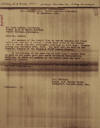
|
27 November
1929.
Invitation to Track Meet from
Major C. H.
Metcalf, Puerto Cabezas, to Mr.
Luis Castro, Secretary, Social Club of
Puerto Cabezas.
|
|
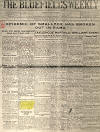
|
30 November
1929.
The
Bluefields Weekly, p. 1.
"Epidemic
of Smallpox Has Broken Out In Rama -
Doctors from Sanitary Deparatment and
National Guard Off To the Scene
—¶ Shortly before going to press we
received news that an epidemic of small
pox has broken out in Rama. On Friday
Dr. Alvarez of the Sanitary Department
and Mr. Moises Cole of the same
institution left for the locality. Today
Dr. Belding of the National guard left
for Rama to assist in coping with the
situation. We trust that with the prompt
action which the authorities have taken
the epidemic will be confined to that
one area, and that it will be soon
overcome. . . . ¶ The American
Legion. ¶ On Thursday
afternoon, the Bluefields Post No. 2 of
the American legion held its first
meeting in the salon of the Tropical
club.: the following gentlemen were
present.—Col. John Marston, Major H. D.
Linscott, Chief of Police C. A. Davis,
Mr. W. Kirwkod, Mr. Moises Cole, Mr.
---Coe, Mr. Hector Lopez, Mr. Bowker,
and Capt. A. LeR Sims. ¶ The meeting was
introduced by Mr. Wm. Kirkwood. The
preamble of the organization was read
and adopted. The motion that the post be
named the Bluefields Post No. 2was
unanimously carried. It was moved by Mr.
Coe, seconded by Major Linscott and
carried, that in Article 2 it be
inscribed that one of the objects of the
local organization was to promote peace
and goodwill between the United states
and Nicaragua. After the reading of the
constitution it was moved by Col.
Marston, seconded by Capt. Sims and
carried, that the constitution be
adopted as read. The following officers
were elected in the usual constitutional
manner: Commander—Chief of Police
Chester A. Davis.—Vice-commander—Major
Linscott; Post-Adjutant Mr. Bowker;
Executive committee—Col. John Marston.
Capt. A. Sims and Mr. E.S. King. It was
also decided that the presence of seven
members would be necessary to form a
quorum. The meeting then adjourned. . .
. ¶ HELD BY BANDITS FOR
RANSOM ¶ Mrs. Oscar
Allestadt, an American Missionary who
was kidnapped by bandits ner the Honan
Hupsch Border, has been released
unharmed. The bandits are however
holding the Rev. Mathias Crewtzin,
another of their victims. They have
reduced his ransom to $3,000.00."
|
|
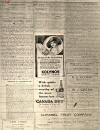
|
30 November
1929.
The
Bluefields Weekly, p. 2.
"THANKSGIVING
DAY, By R. M.Hooker. ¶ Once
again the hearts of our North American
neighbors are turned on the celebration
of the Thanksgiving festival. This is
one of the most unique of festive days
set apart by the American people in
commemoration of the founding and
preservation of their native land by
Divine Providence. ¶ The first
Thanksgiving Day was indeed a propitious
occasion. A small number of
stout-hearted persevering, religious
people were forced to leave their native
land. The land they had adopted was a
most cruel one. They had to fight
against the rigors of a cold and bleak
climate. The soil was unyielding. They
encountered wild beasts and savages, but
yet this little band of endeavorers
decided to continue in their struggle
for the ideal that they had in mind. ¶
At the first harvest they gathered in
the fruits of the field that they had
secured with their crude methods of
farming. They decided then to hold an
assembly and thank God for having
preserved them from famine and cold.
Such was the first Thanksgiving Day in
the little colonial settlement of bleak
New England. ¶ As years passed the
American people were united into the
strong nation that they are today. This
custom of Thanksgiving was at first
solely a new England Festival, but a
united nation soon said that it was an
essential factor in the life of any
nation to have a day set apart to give
thanks to God. For this reason it was
made a National Festival and now as each
anniversary comes around the President
of the U.S. makes issue of proclamation
voicing the sentiments of the entire
nation. ¶ We in Latin America
congratulate our North American neighbor
on her great festive occasion, in the
hope that the spirit of the first
thanksgiving will always remain the
ideal of the American nation now that it
has become a great World Power. ¶ For
the benefit of our readers we publish a
Thanksgiving Address of Pres. Roosevelt.
¶ THANKSGIVING DAY PROCLAMATION,
1905 ¶ By Theodore Roosevelt ¶
When, nearly three centuries ago, the
first settlers came to the country which
has now become this great republic, they
found not only hardship and privation,
but terrible risk to their lives. In
those grim years the custom grew of
setting apart one day in each year for a
special service of thanksgiving to the
Almighty for preserving the people
through the changing seasons. The custom
has now become national and hallowed by
immemorial usage. We live in easier and
more plentiful times than our
forefathers, the men who with rugged
strength faced the rugged days; and yet
the dangers to national life are quite
as great now as at any previous time in
our history. It is eminently fitting
that once a year our people should set
apart a day for praise and thanksgiving
to the giver of Good and at the same
time that they express their
thankfulness for the abundant mercies
received, should manfully acknowledge
their shortcomings and pledge themselves
solemnly and in good faith to strive to
overcome them. During the past year we
have been blessed with plentiful crops.
Our business prosperity has been great.
No other people has ever stood on as
high a level of material well-being as
ours now stands. We are not threatened
by foes from without. The foes from whom
we should pray to be delivered are our
own passions, appetites, and follies,
and against these there is always need
that we should war. ¶ Therefore, I now
set apart Thursday, the thirtieth day of
November, as a day of thanksgiving for
the past and of prayer for the future,
and on that day I ask that throughout
the land the people gather in their
homes and places of worship, and to
render thanksgiving unto the Most High
for the manifold blessings of the past
year, consecrate themselves to a life of
cleanliness, honor, and wisdom, so that
this nation may do its allotted work on
the earth in a manner worthy of those
who founded it and of those who
preserved it. . . . ¶
Weekly Selections from Scripture
(Contributed by Rt. Rev. Guido Grossman)
. . . Notes from Puerto Cabezas . . . "
|
|
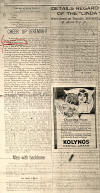
|
14 December
1929.
The
Bluefields Weekly.
"CHEER UP
JEREMIAH! ¶
Now-a-days we hear a great many
Jeremiads being recited concerning the
retrogression of the Creoles of the
Coast. We hear a lot about what was done
in the grand old days when the Creoles
wee a factor to be reckoned with. We
hear of the many men in our midst who
are possessed of ability, tact and
courtesy to conduct business
successfully and we wonder why it is
that others are coming in and doing all
the selling while we stand outside and
sweat to obtain the money to spend as
the consumers. We are holding on to the
rough end of the pole. We do not like
it, but what are we to do to better our
lot? Well, let us look and see what some
of our country-men around the corner are
doing. ¶ Not very long ago someone
realized the possibilities of developing
a rice industry in Pearl Lagoon.
Accordingly efforts were made to get the
people to cooperate, and a rice huller,
engine and thresher were obtained. The
villagers were encouraged to plant rice.
It is only recently that all the
instruments were got into efficient
working order but now they are giving
good results. Led by the brains of the
Young Men’s Christian Union in Pearl
lagoon, which said Union incidentally,
owns the largest rice field up there,
the Pearl Lagoon people have established
a rice industry which is growing daily.
They have already made several shipments
to the Bluefields Mercantile Company.
They are expected to send down another
this week. Next year they hope to extend
their operations. In a conversation with
the Rev. Hedley Wilson we gathered that
in increasing numbers people are
becoming interested in rice cultivation
and several are making enquiries as to
the possibilities of growing it on a
profitable scale in Pearl Lagoon. We
predict a prosperous future for this
village. And what will have brought
about this happy state of affairs?
Simply the vision of a few men who
realized that it was possible for the
inhabitants of Pearl Lagoon to become
independent by their own efforts. We
believe that Rev. Fr. Wolff was among
the initiators of the scheme. To proceed
, these men did not “make dreams their
masters”. They thought, they spoke and
they acted. We have thought a great
deal. We have spoken too. Have we acted?
Have we endured the hardships which give
birth to success? Have we faced the
sneers and criticisms of others? If we
think we have, and still have not
succeeded, there are but two
alternatives open to us. We must either
keep on chanting our lamentations or
quit ourselves like men, and set to work
more seriously than ever to work out our
deliverance. Remember this! If we do not
lift ourselves, all other people are too
busy looking after themselves to set us
on our feet."
|
|
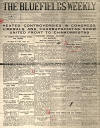
|
21 December
1929.
The
Bluefields Weekly.
"PEARL
LAGOON NOTES. Dedication of
organ in Moravian church. Sunday,
December 15th, 1929, will long be
remembered in Pearl Lagoon. It marked
the climax of the efforts on the part of
the Moravians there to secure a new
organ. The old organ had been a very
good one, and had survived one hurricane
and a couple of revolutions. For years
it had been giving trouble, especially
since the last revolution, so it had to
be laid aside. The knowledge that the
new organ would be consecrated free of
debt was the cause of added joy to the
occasion. ¶ Promptly at 3 o’clock in the
afternoon the service was begun, the
Rev. Hedley Wilson officiating. The
following was the order of service:
Organ prelude by Mr. Jas. Cuthbert;
Hymn, “Now Thanks we all our God”;
Prayer by Rev. B. Garth; Anthem. “He
maketh peace” (Caleb Simper); Lesson:
Ps. 149 and 150; Hymn.”In humble
grateful lays”; Responsive reading for
the dedication of the organ: Hymn,
“Praise the Lord, His glories show”;
Sermon, text: s. 15, 4: Anthem. “The
voice of singing” (W. Mason); Hymn,
“Sing hallelujah, praise the Lord” ;
Benediction; Postlude. ¶ At the service
beginning at 6;30 p.m. the choir have
special music. The Rev. F.B. Garth
occupied the pulpit. Mr. Jas. Cuthbert
and Rev. H. Wilson took turns at the
organ for the rendition of the anthems.
. . . ¶ PUNTA GORDA NOTES.
¶ Dr. Boles of the National Guard and
Mr. Humberto Hernandez R. of the
Sanitary Department came down here last
week to investigate the small pox
epidemic. ¶ Four cases have been
discovered, and they were all members of
the same family, living at Virginia. ¶
The complaint is in a very mild form.
About six hundred people have been
vaccinated. The others will be
vaccinated by Dr. Mayorga, who has
authority from the Sanitary Department
to deal with the situation and to see
that all persons who embark or disembark
here have been recently vaccinated. . .
. ¶ VIBRATION FROM PUERTO
CABEZAS. ¶ Capt. John C. Wood
G.N. ¶ Being duly apprised that Guardia
Nacional had a new officer enrolled as
its head at this port, we interestedly
wended or foot-steps thither to welcome
the newcomer, Capt. John C. Wood, who on
our arrival received us mot courteously
at this new bivouac with that unruffled
refinement and polish expressive of the
western gentry, in which niche he holds
a prominent place. ¶ On exposing our
mission, we gathered from this reserved
office, that he is a son of San
Francisco, California, the largest and
most important city on the Pacific slope
of the American continent, founded the
latter part of the eighteenth century by
Spanish Franciscan monks from Mexico,
when the English colonists on the
Atlantic coast declared their
independence from Great Britain. ¶ Thru
other channels we gained the
information, that he was fostered and
trained at the world famed
Leland-Stamford, the august University,
which has given to the American people a
Hoover and other eminent figures. ¶ To
this modest exponent of goodwill, we
extend our heartiest greetings."
|
|
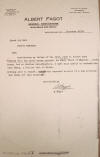
|
31 December
1929.
Letter from
Albert Fagot, Cape Gracias, to
Lt. W. G. Hall, Puerto Cabezas.
"Sir; ¶
Confirming my letter of the 14th, wish
to report that Indians from the upper
river reports an other bunch of Bandits,
above Bocay, but on further
investigation, I have been unable to
substantiate this rumor, I believe that
it is false. ¶ Nothing else to report.
Except the expected arrival of a new
Governor and Judge for this District. ¶
Respectfully, [signed] A Fagot"
|
|
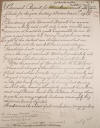
|
1.
31 December 1929.
Annual Report for Haulover and its
Filials for the Year Ending December 31,
1929, by J. A.
Fisher, Moravian Church, p. 1.
|
|
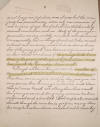
|
2.
31 December 1929.
Annual Report for Haulover and its
Filials for the Year Ending December 31,
1929, by J. A.
Fisher, Moravian Church, p. 2.
|
|
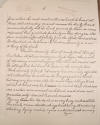
|
3.
31 December 1929.
Annual Report for Haulover and its
Filials for the Year Ending December 31,
1929, by J. A.
Fisher, Moravian Church, p. 3.
|
|
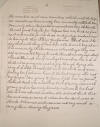
|
4.
31 December 1929.
Annual Report for Haulover and its
Filials for the Year Ending December 31,
1929, by J. A.
Fisher, Moravian Church, p. 4.
|
|
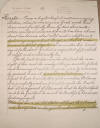
|
5.
31 December 1929.
Annual Report for Haulover and its
Filials for the Year Ending December 31,
1929, by J. A.
Fisher, Moravian Church, p. 5.
|
|
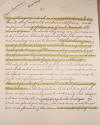
|
6.
31 December 1929.
Annual Report for Haulover and its
Filials for the Year Ending December 31,
1929, by J. A.
Fisher, Moravian Church, p. 6.
|
|

|
7.
31 December 1929.
Annual Report for Haulover and its
Filials for the Year Ending December 31,
1929, by J. A.
Fisher, Moravian Church, p. 7.
|
|
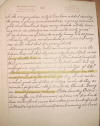
|
8.
31 December 1929.
Annual Report for Haulover and its
Filials for the Year Ending December 31,
1929, by J. A.
Fisher, Moravian Church, p. 8.
|
|
|
|
|
PREVIOUS
NEXT
|
|
|
|
|
|
|
|
